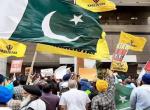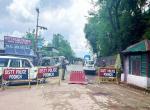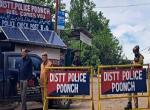When we were caught unawares by the Pakistani intrusion into Kargil a high powered committee was set up under Shri K.S. Subramaniam, who had been Defence Secretary of India, to suggest measures whereby we could avoid intelligence failures, provide for a quick response to a Kargil like situation and take such counter insurgency measures as would make India secure. Like all reports of this nature the Subramaniam Committee report also was never meaningfully implemented. We even failed to set up a coordinating agency within the armed forces under a Chief of Defence Staff, not so much because the civil service component of the Defence Ministry opposed this but because there was inter-service rivalry between the armed forces and no Chief was prepared to accept a higher authority for the purpose of coordination. Since Kargil, just as it was before Kargil, India has continued to be a target of terrorism, largely sponsored by our neighbour, Pakistan, but also terrorism which has been born within the country. I am including insurgency and militancy which use violence as a major weapon within the definition of terrorism and, therefore, Naxalite violence or the type of violence one sees in Jammu & Kashmir would also come within the overall ambit of terrorism.
In the United States of America on 11th September 2001 aircraft were used by terrorists as living bombs and crashed into the World Trade Centre Twin Towers in New York and the Pentagon in Washington D.C. Several thousand lives were lost and even more injured in these horrible examples of extreme terrorism in which aircraft were used as suicide bombs. Now it is a fact that the United States of America is a federation in which all residuary powers vest in the States, which means that what is not specifically reserved for the Federal Government is available to the State Governments. In India the reverse is true because under the Seventh Schedule of the Constitution, apart from the Union List which gives the exclusive powers of Parliament and the State List, which gives the exclusive power of the State Legislatures, there is the Concurrent List in which both law making bodies have the power to legislate, with the rider that a law of Parliament overrides a State law on the same subject. Residuary powers are vested in the Centre and there are circumstances under which the Centre can give directions to the States, can legislate on behalf of the States under certain circumstances even on matters in the State List and can go to the extent of dismissing a State Government and assuming direct federal control under Article 356 of the Constitution. In other words, India is a very centripetal federation, heavily weighted in favour of the Centre. Despite this, after 11th September 2001 incident the United States government decided to take really effective measures to prevent a similar attack in future. Agencies like FBI and CIA were strengthened and their powers enhanced and a national counter insurgency centre was set up which had the authority to intercept mails, telephones and various electronic means of information and communications technology and to take effective action to arrest and neutralise would be terrorists.
None of the State Government raised any objection to the new arrangement, despite the fact that the counter terrorism organisation was armed with police powers which lay within the domain of the State and local governments. No one distrusted the new arrangement or considered it politicised and the States had full confidence that the agency would use its authority against terrorists and would not harass ordinary citizens or destablise State Governments. What is more, the police at all levels, city, county, State and federal, all work in tandem. Their single objective is the maintenance of law and order and ensuring the safety and security of citizens and they do not eye each other with suspicion. The culture there is that in performing its police functions the Force is allowed to work according to law and the kind of political and other interference which takes place in India is virtually unknown. In Madhya Pradesh recently the Home Minister insisted on the suspension or at least the transfer of an Inspector of the Traffic Police because he dared to pull up a twenty-year old boy for not wearing a helmet when riding a two wheeler. The boy was the son of a party worker. Moving out the Inspector in this manner naturally demoralizes the entire Force and to expect it thereafter to maintain order and counter terrorism would be virtually impossible of achievement. Defying a traffic policeman in Britain or United States is totally unthinkable. This example is being given because if in the minor matter of a traffic violation the Home Minister intervenes and prevents the police from performing its function how can anyone trust the police to be able to deal with a major threat of terrorism.
The Government of India has been trying to create agencies within the government structure which could collect and collate intelligence, pass on actionable information to the field authorities and then ensure that the terrorist organisations are hit hard enough to hurt. If we go back to the beginning of the twentieth century, especially at about the time of the Partition of Bengal by Lord Curzon, a terrorist organisation called the Anusheelan Party came into being. Its organisation was cellular and, therefore, very secretive. The bomb and the bullet were their favourite weapons. The British used some young Bengali officers of the Bengal Police to penetrate this organisation, collect information on different cells, which were largely unconnected and when the intelligence input became adequate they suddenly struck and virtually destroyed the Anusheelan Party. This was one of the most successful counter terrorism campaigns ever conducted in India. The Bengal Police was totally trusted by the British, just as the Punjab Police was trusted in dealing with the Ghadar Movement. In the Punjab it is only after Julio Rebeiro and K.P.S. Gill revitalised the Punjab Police and it came to the forefront in dealing with Khalistani terrorism that the situation began to normalise. The day the J&K Police becomes operationally capable of taking on militancy in the State we shall control this phenomenon. The Special Operations Group of the J&K Police has already begun to show signs of promise. In the Naxalite areas the model force would be the Andhra Pradesh Police which has targeted the top leaders and eliminated them and has the situation firmly in control in the Telangana area. This is the capability of our police, provided it is given good leadership and this is the Force which must be co-opted into countering nationwide terrorism. We have to ensure that NCTC does not become a surrogate of the State Police. Its role has to be of a mentor, a provider of credible information and, where necessary, a strike force that will complement the State Police.
As originally envisaged NCTC was to operate within the framework of the Intelligence Bureau. Under Entry 9 of List 1 of the Seventh Schedule of the Constitution Parliament has the power to legislate both on the Intelligence Bureau and on the Central Bureau of Investigation (IB) and (CBI). Unfortunately even today there is no law governing both these organisations and such police powers that CBI has are enjoyed as the Delhi Special Police Establishment created by the DSPE Act. Naturally the States were extremely wary of a wing of IB, not accountable to Parliament because it is a purely executive branch of government, with NCTC being empowered to enjoy police powers in the matter of striking at terrorists, taking armed action and arresting people, apart from intercepting telephone calls, and means of electronic communication in the realm of information technology and information communication technology that non-Congress States opposed the move because they were convinced that the new organisation would be used to spy on political opponents and to arrest and harass political leaders opposed to the ruling party. Many Congress Chief Ministers also have reservations. Therefore, NCTC could not be constituted, intelligence is both scattered and random and there is no fully legally empowered coordinating agency which can not only obtain and analyse intelligence but also strike against terrorists without any delay. IB is not and does not have a strike force, NIA looks at cases at the stage when an incident has occurred and has to be investigated ex post facto. Who will make preemptive strikes? The States have raised the bogey of a conspiracy by the Centre to curtail State autonomy and intervene in matters within List 2 of the Seventh Schedule. Incidents like Hyderabad, therefore, continue to happen. The mutual distrust of Central agencies and State Police Forces continues. This environment is not conducive to cooperative effort or coordinated action.
Coordination apart, it must also be realised that the State Police has to function under strong political constraint. Many terrorist groups have local political connections and if the police tries to deal with them impartially, then these terrorists can use their political strength to negate police action, thus enhancing terrorism. The importance of a federal agency is that it is not under local influence and, therefore, can afford to be more objective and impartial. A local goonda or terrorist may have a limited sphere of influence within which he feels safe, but if national level agencies come into action then that local influence disappears and the law will take its course. My submission is that a central organisation does not weaken the State Police but instead helps in creating an environment in which the State Police can act. This is a matter worth consideration.
There is the fear that the State Police will be superseded by NCTC , which will then arrest opposition Chief Ministers, thus creating a political path along which the ruling party at the Centre can walk to power in that State. Apparently, these fears are grossly exaggerated because NCTC will not replace the State Police, it will have to hand over the accused persons to the local police station after they have been caught and the entire legal procedure will have to be followed by the investigating agency. Apart from the new agency being under political watch it will also be subject to the scrutiny of courts. After the Keshwanand Bharti case no one in India can possibly weaken the courts or remove executive agencies from the scrutiny of the court. If NCTC acts arbitrarily, under political influence or unprofessionally then the courts will intervene and restore the balance. At the same time if NCTC becomes not only an instrument for sourcing of information but also a coordinator of action against terrorists and conspirators of terror we can certainly become more secure.
The United States is fortunate that it has a friendly neighbour, Canada, on the northern border and an equally friendly neighbour, Mexico, on the southern border. The eastern and western borders of the country face two huge oceans which are very much under the control of the United States’ Navy and Coast Guard. Infiltration of terrorists from abroad, therefore, is very difficult. Home grown terrorism based on religion, caste, or region is almost unknown. India has a porous northern, western and eastern land frontier, facing as we do Pakistan and, close by, Afghanistan and China, a not always friendly Bangladesh and Myanmar which, till very recently till our relations with the country improved, was not averse to sheltering militants from our north eastern States. Our sea frontiers are liable to infiltration from Pakistan, from the Arab littoral and from various insurgent groups or pirates which might crop up from time to time towards our east. Terrorism is exported to India and, therefore, is difficult to control. Besides this we have our own internal problems of terrorism, militancy, separatism and violence emanating from religion, caste and region. To the extent the Naxalites use violence as a major weapon, Naxalism is a form of terrorism. A communal riot takes place, it further divides communities and this encourages the growth of terrorism. Every time we allow people to bring the law into contempt because no one obeys the law we encourage terrorism. Apart from NCTC, therefore, it is absolutely essential that we put an end to sectarian and regional strife, control separatist movements which are home grown and ensure that communal riots do not take place. In all this a central authority for the control of terrorism becomes of vital importance and it is about time our political parties started to think nationally and eschewed narrow parochial interests. It is in this context that a legally constituted Intelligence Bureau, properly empowered and made accountable, is vital. Its mandate already includes counter espionage, which would cover insurgency, militancy and terrorism. Once the IB is made accountable by law, NCTC should be located within it. One can then assume that the States will accept NCTC as a friend and hostility to it will cease.
Published Date: 2nd March 2013









Post new comment